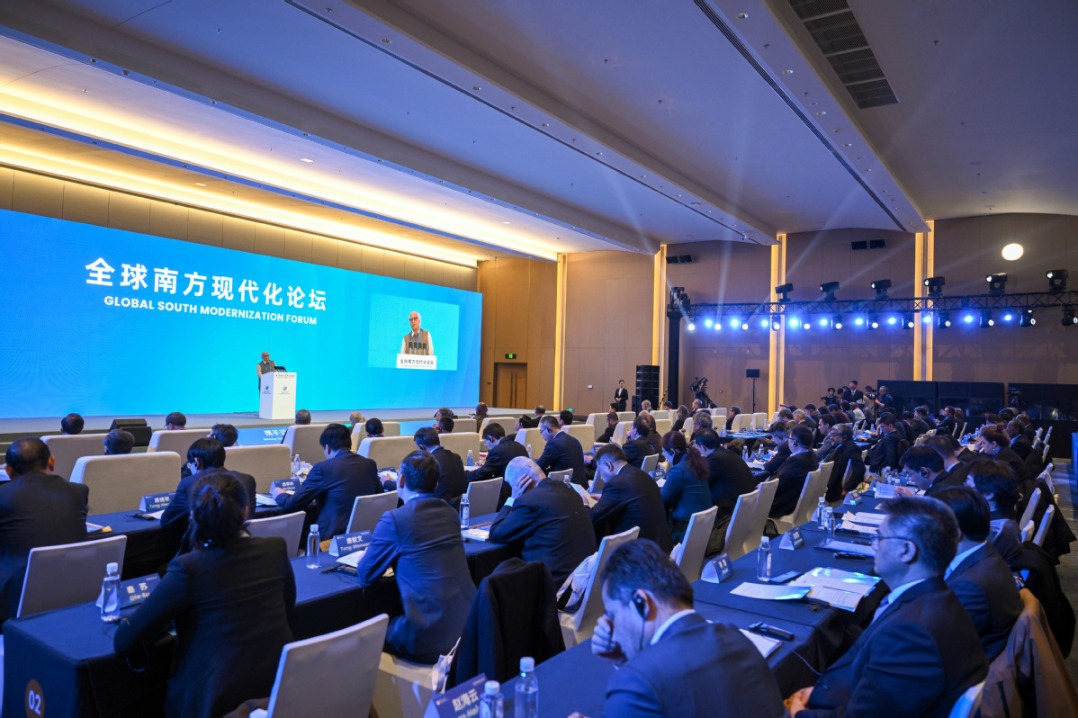China has a key role in safeguarding the Arctic

The key issue is to find a balance between exploiting and protecting natural resources
Arctic affairs can be divided into those of a regional nature and those that have global implications. Those that are regional are properly resolved through negotiations between countries of the region. China respects the sovereignty and sovereign rights of arctic countries, and hopes that they can peacefully resolve their disputes over territory and sovereignty.
On the other hand, global arctic affairs need to be handled in a considered way through global governance and multiparty participation. Global issues are a challenge to humankind. They include climate change, arctic ice melting, environmental pollution, and ecological crisis. Those problems span continents and they cannot be solved by a single country or region. Instead, solving them requires nations to work together in a spirit of cooperation, with the public good uppermost in mind.
The most pressing problem of arctic governance is how to find a balance between exploiting and protecting natural resources, including natural and social ecology. The mechanisms of arctic governance are still being formed, a process that lags what is happening in the world and needs to be accelerated. That includes improving enforcement and expanding representation.
The evolution of arctic affairs is related to changing factors globally. The first is the end of the Cold War, which has turned the arctic from a battlefield of US-Soviet confrontation into an area of peaceful cooperation. The second is economic globalization that integrates means of production wherever it occurs. It links the economy of the arctic and the rest of the world through trade, navigation, information exchange and capital flow.
The third is climate change, which has had a direct impact on the environment of the arctic and has harmed the lives of people in the northern hemisphere, including China, particularly in production.
The fourth is scientific and technological progress. Conflicts over the Arctic and its environment and resources can only be solved by developing global technology.
China has no direct interest in the arctic region and will not use its influence there. World peace, protecting the environment and technological advancement everywhere are compatible with the interests of all nations, including China. Of course, in arctic affairs, countries of the region bear more responsibility. But China, as a large country, has a contribution to make in advancing the causes of peace and development. That is particularly true given the country's rapid economic development and its being one of the largest trading blocs.
Like China, most countries in Europe are close to the Arctic, and thus are important forces in its governance. China and the EU hope to become permanent observers on the Arctic Council, and that expectation is eminently reasonable.
In the era of globalization, economic development is closely related to navigation and resources. As arctic ice melts it is important to find out how to make the most of navigation and resources while ensuring that the environment and ecology are protected. China and the EU, as two of the biggest economies, and with huge trade volumes and highly developed technology, should take permanent responsibility in contributing to arctic affairs.
As potential users of arctic navigation and resources, the EU and China, with other important non-arctic countries, need to lay the groundwork for environmental protection. Their governments should act as guardians of these resources by encouraging companies involved in arctic programs to be more environmentally conscious, particularly in developing technologies that are more sensitive to the environment.
At the bottom of all of this is that any wise management of arctic resources demands that changes to the environment be fully taken into account.
In an era of globalization, as transnational problems predominate in matters of governance, the Arctic Council needs to adopt a more inclusive attitude. It should not exclude large countries outside the region from having their say, which is tantamount to denying their legitimate rights, relieving them of their responsibilities and taking away from them the opportunity to make a valuable contribution. In doing so, the Arctic would be denied the good governance it must have.
China has traditionally enjoyed a very warm friendship with European countries, including Nordic ones. What provides a solid footing for China-Europe cooperation on arctic affairs is the global vision and the inclusive understanding of global problems and their solutions that European politicians and scholars often demonstrate.
In April Premier Wen Jiabao visited Iceland and signed an agreement on collaborative arctic scientific investigation. That cooperation provides an opening for both China and Europe. China has made some achievements in polar region technology. It has experience in Antarctic scientific investigation, and it can share with European countries its experience of protecting natural and social ecology in building infrastructure on frozen ground on the Qinghai-Tibet Plateau.
Cooperation with European countries, especially the Nordic ones, can help China demonstrate that it has a positive contribution to make in arctic affairs, is a champion of arctic peace and a protector of the arctic environment, and that it respects and abides by the rules of arctic governance.
The author is vice-president of Shanghai Institutes for International Studies. The views do not necessarily reflect those of China Daily.
(China Daily 06/29/2012 page9)
Today's Top News
- China, US hold maritime safety talks in Hawaii as Beijing reiterates warnings on sovereignty
- China sends letter to UN over Japanese PM's remarks on Taiwan
- Chinese, Uzbek FMs hold second strategic dialogue
- G20 an opportunity to strengthen Sino-EU ties
- China, Africa foster shared food security
- Japan urged to take practical steps to honor its commitments to China






























